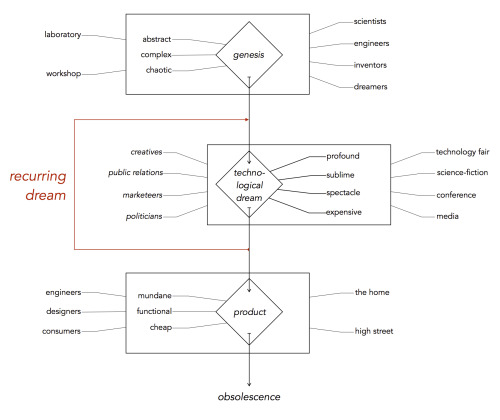James, at Crap Futures, blogged last week this intriguing diagram:

Of course one can always argue about modifications and missing connections, it somehow gives a pretty good outline of "the journey of a technology." When observing it the other day, I quickly realized it should be less of an arrow, and more of a cycle... considering that it takes many (failed) products to have a technology reaching a sort of maturity (and then obsolescence). But the red "recurring dream" part plays that role in the diagram; I can't help thinking about technological flops that belonged to this category (humanoid robots, smart homes, monorails, VR/AR headsets, etc.) How can we revisit the evolution of <technology> based on this?
Given that the crap futures blog insists on deconstructing smartness, I can imagine that the diagram can be helpful to map the various parameters around which the notion of networked/smart/connected/automated objects are built. Also, this diagram is relevant because it can help to generate (micro-)briefs. Say, you want to work on *teh smart home of teh future*, it would be intriguing to design several versions: the cheap one, the functional one. Alternatively, one can also think about the ingredients to design such technology: what if the smart home of the future was designed sans consideration for science-fiction (you remove that bit from the diagram) and an important emphasis on the sublime/spectacle? What would be the result (beyond an episode of The Simpsons)?


